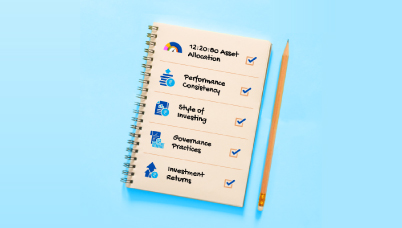Mutual Fund Investment Guide For Beginners
Posted On Friday, May 17, 2013
As children all of us loved the idea of getting gifts. May it be a doll for a girl or a toy car for a boy, gifts were always close to our hearts. A ‘piggy bank’ was one such gift that each of us must have received during our growing days. From those lock shaped one’s to those in a shape of a favourite cartoon character or those literally a shape of a pig, these piggy banks were meant to be much more than just a gift. They were teaching us a habit, a habit of saving up for a rainy day.
Since then, we have been introduced to the importance of saving money. While those were the days we saved money for a special treat or mom’s birthday gift, today our goals have become bigger. It could be buying a car, or a house or it be your turn to save for your child’s education, his/her marriage, your retirement etc, we plan our finances so that we are able to fulfill all these goals.
Many people invest in bank deposits, NSCs, PPF Accounts, physical gold, real estate, etc. While these investment options may prove to be sound investment options, looking at the growing inflation numbers it is advised that one needs to have some of his/her assets in an asset classes like equities which tend to give better returns than inflation over the long term.
Mutual funds are a common man’s vehicle to the world of equities. Regulated by the Securities and Exchange Board of India (SEBI), a mutual fund is a professionally managed pool of money from many investors and that is invested in stocks, bonds, short-term money market instruments and other securities in accordance with objectives as disclosed in offer document of a Mutual Fund Scheme. Mutual funds are managed by financial experts also called fund managers, who invest the money on behalf of the investors.
To help you decide whether you can consider mutual funds as your investment option, let’s look at some reasons why you might want to consider investing in mutual funds:
Diversification:
Diversification involves holding a wide variety of investments in different asset classes in a portfolio so as to reduce risks. Your portfolio of Mutual funds Schemes should be spread across investments in various industries and asset classes. If you invest most of your savings in a single security or a single type of security you are exposed to any risk that is inherent to those investments. Assume you have put all your life savings in the shares of XYZ & Co. and that company goes bust, your entire investment amount drops to zero, which is very risky. Thus in order to balance-out the risk factor, you need to diversify your investments. Over past 10 years generally a trend has been observed that most of the times whenever equities have fallen, gold has risen, so it may make sense to invest in both so as to offset the loss caused by investing in only one asset class. Thus, by investing in mutual funds, you can avail of the benefits of diversification.
Professional Management:
This is another major advantage of investing in a Mutual Fund. When you opt in for a Mutual fund scheme, your money is taken care of by a skilled fund manager. Fund Managers are experienced and skilled professionals, who conduct investment research and analyze the performance and prospects of various instruments before selecting a particular investment. Thus, by investing in mutual funds, you can avail of the services of professional fund managers, which would otherwise be difficult for an individual investor to avail of. A lot of people believe that they can time the market better, most fail due to the lack of knowledge and time taken to monitor and analyse each investment. As they say 'Its best to leave it to the experts.'
Ease of Investment:
Due to lack of money, it may not be possible for a retail investor to buy a stock, however mutual funds allows them to invest in equities in smaller denominations. Further smaller denominations of mutual fund units enables investors to make periodic investments through SIP. A Systematic Investment Plan (SIP) is a vehicle offered by mutual funds to help investors save regularly. An SIP is a mode of investment whereby you, the investor, invest a pre-determined amount on a monthly basis, on a pre-determined date, into a particular mutual fund scheme, thereby building your savings over time. Today, it is the most common and conveniently chosen method of investing by retail investors.
Liquidity:
Another advantage of mutual funds is its liquidity. You can buy and sell mutual fund units easily. The liquidity of a mutual fund unit determines how quickly you could sell your units of the mutual funds. Since they are very well integrated with the banking system, most mutual funds can send money directly to your banking account. If the investor wants to redeem his investments, he could use add on facilities like Systematic Transfer Plan (STP) and Systematic Withdrawal Plan (SWP). An STP is a plan that allows the investor to give a mandate to the fund to periodically and systematically transfer a certain amount from one scheme to another of the same fund house, whereas an SWP is a facility that allows an investor to withdraw money from an existing mutual fund at predetermined intervals.
Well Regulated:
Mutual funds in India are regulated and monitored by the Securities and Exchange Board of India (SEBI), which strives to protect the interests of investors. Mutual funds are required to provide investors with regular information about their investments, in addition to other disclosures like specific investments made by the scheme and the proportion of investment in each asset class. With SEBI watching Mutual Funds with a hawk eye, investors are that much more protected against malpractices creeping into the system.
Moreover, you should also remember that there is also a certain amount of market risk associated with Mutual fund and you must carefully read the offer document before making any investment in a scheme.
Therefore, with all these reasons to invest in mutual fund, you are also offered a wide spectrum of investment products to suit your investment needs and allows diversification of risk with the help of a professional fund manager to take care of your hard earned money. All you need to do is make a wise decision of choosing a fund whose objective matches to that of yours and monitor it from time-to-time.
Mutual fund investments are subject to market risks read all scheme related documents carefully.
Related Posts
-

Do You Need to Update Your KYC/Modify KYC?
Posted On Friday, Apr 26, 2024
New KYC Regulation Effective April 1st 2024
Read More -

Are You Stuck in the Past or Ready for a Secure Future?
Posted On Wednesday, Jun 29, 2022
The ever-growing number of mutual fund schemes on offer has made it challenging for investors to select the best and most suitable one.
Read More -

Received an Increment? Step-up Your SIPs
Posted On Wednesday, Jun 01, 2022
For instance, let’s assume that you have registered for a monthly SIP of Rs 5,000 for a 10-year period and later on try to step-up the SIP at an annual frequency, say by Rs 500. In the first year...
Read More



